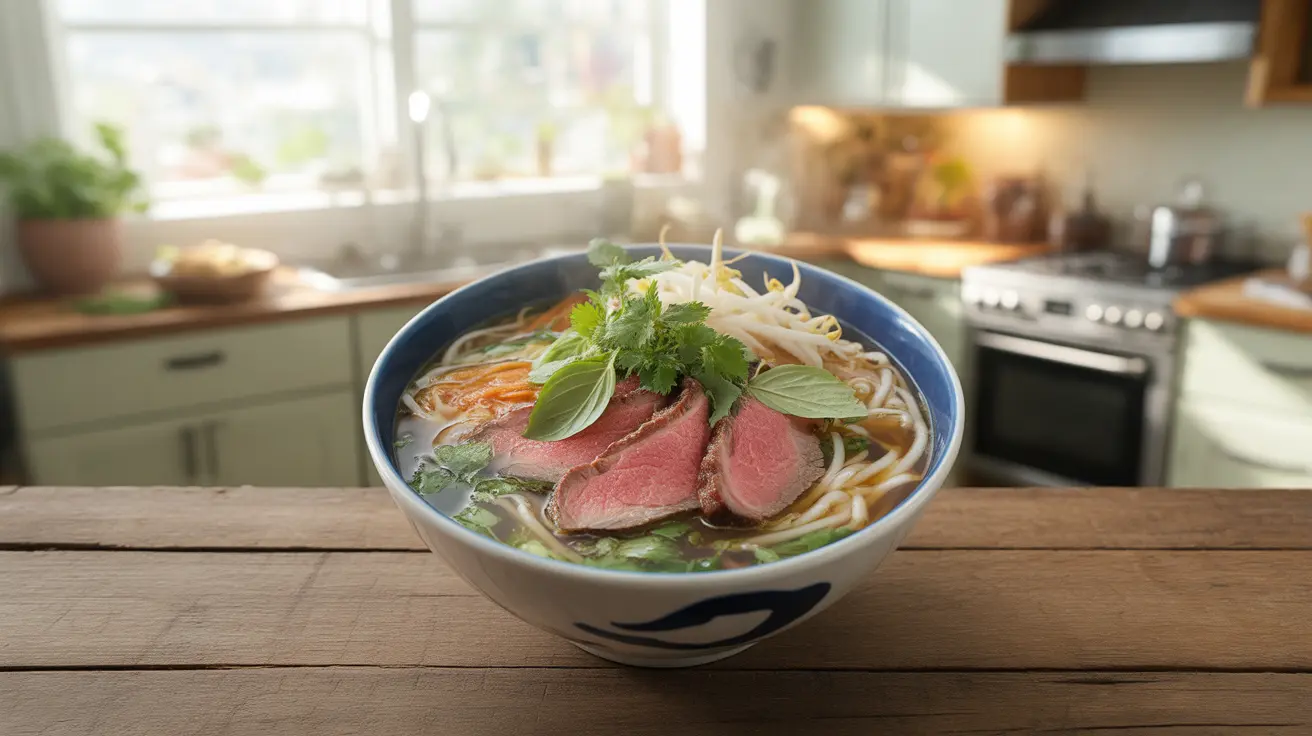Pho, the beloved Vietnamese noodle soup, has gained worldwide recognition not just for its rich, complex flavors but also for its impressive nutritional profile. This traditional dish combines bone broth, rice noodles, herbs, and protein sources to create a satisfying and potentially healthy meal option.
Understanding the health benefits and nutritional composition of pho can help you make informed decisions about incorporating this comforting soup into your diet. Let's explore what makes pho a noteworthy addition to your meal choices.
The Foundation: Nutrient-Rich Bone Broth
At the heart of every bowl of pho lies its signature bone broth, simmered for hours with herbs and spices. This foundational element provides several health benefits:
- Collagen and amino acids for joint health
- Minerals including calcium and phosphorus
- Compounds that may support gut health
- Natural electrolytes for hydration
Protein Content and Muscle Support
The protein content in pho varies depending on your choice of meat, but traditional options like beef or chicken provide substantial protein benefits:
- Complete protein source with essential amino acids
- Typically 20-30 grams of protein per serving
- Supports muscle maintenance and repair
- Promotes satiety and fullness
Herbal Elements and Their Benefits
The herbs and aromatics in pho contribute more than just flavor:
- Thai basil: Contains antioxidants and anti-inflammatory compounds
- Cilantro: Rich in vitamins A, C, and K
- Green onions: Source of allicin and other beneficial compounds
- Bean sprouts: Provide vitamin C and fiber
Sodium Considerations and Modifications
While traditional pho can be high in sodium, there are ways to make it healthier:
- Request reduced-sodium broth when dining out
- Prepare homemade broth with controlled salt content
- Balance sodium intake throughout the day
- Choose additional vegetables to boost nutrient content
Gluten-Free Properties
Pho can be an excellent option for those with gluten sensitivities:
- Rice noodles are naturally gluten-free
- Traditional preparation methods avoid gluten-containing ingredients
- Important to verify preparation methods at restaurants
- Suitable for celiac disease when properly prepared
Frequently Asked Questions
What are the nutritional benefits of eating pho noodle soup?
Pho offers a balanced combination of protein, carbohydrates, and micronutrients. The bone broth provides minerals and collagen, while herbs add antioxidants and vitamins. A typical bowl contains lean protein, complex carbohydrates from rice noodles, and various nutrients from fresh herbs and vegetables.
How does the sodium content in pho affect health, and can it be reduced?
The sodium content in pho can be significant, potentially affecting blood pressure and fluid balance. However, you can reduce sodium by requesting less salt, making homemade broth, or choosing low-sodium options. Balance high-sodium meals with lower-sodium foods throughout the day.
Is pho a good source of protein for muscle growth and repair?
Yes, pho can be an excellent source of protein, especially when made with lean meat options like chicken or beef. A typical serving provides 20-30 grams of complete protein, supporting muscle growth and repair. The amino acids from the bone broth also contribute to protein content.
Can pho be a healthy option for people who need gluten-free meals?
Pho is naturally gluten-free when made traditionally with rice noodles and without added wheat-based ingredients. However, those with celiac disease should verify preparation methods and potential cross-contamination risks when dining out.
What are the health advantages of the herbs and bone broth used in pho?
The bone broth provides collagen, minerals, and compounds that support joint and gut health. Fresh herbs like Thai basil, cilantro, and green onions contribute antioxidants, vitamins, and anti-inflammatory properties. Together, these elements create a nutrient-rich base with potential immune-supporting benefits.




